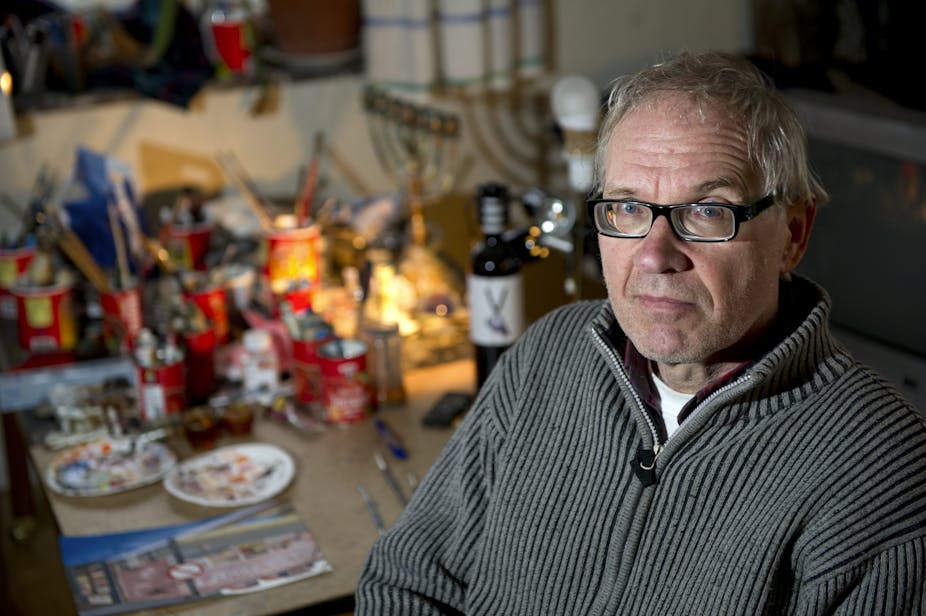The first appearance by the controversial Swedish artist Lars Vilks since the Copenhagen terrorist attacks was always going to be a tense affair. But just as I was preparing to leave for his talk in Gothenburg this weekend, I got a text message from another attendee telling me it was all off.
Vilks was to appear alongside other figures from the Swedish media at a talk on March 6. The panellists were to discuss the implications of the attacks in Copenhagen for freedom of expression in parallel with the Gothenburg media fair. It ended up being the latest in a long line of cancelled events.
Vilks has lived under tight security since depicting the prophet Mohammed as a dog in a 2007 cartoon but since the February attacks he has had to be even more cautious. The artist believes he was the target of Omar Abdelhe went on to kill a security guard at a synagogue. Vilks survived unhurt but it now seems as though his freedoms have been even further curtailed.
Every event he attends has tight security and a recent interview he gave to the Associated Press was conducted in an abandoned barn in the Swedish countryside.
A new climate of fear
This latest talk was supposed to be an open public event on the limits of free speech, and no threats had been made. The Gothenburg police had given it the green light and hundreds had signed up to attend. Goethenburg is not a political hotspot, but a city in which such debates are a regular occurrence and an important part of the political and cultural scene. It has a counter-cultural reputation but that generally flies below the international radar.

The event had already been rescheduled once after an association of teachers meeting in another part of the venue had objected, before being removed entirely from the bill, ostensibly for the same reasons. Vilks had already been subject to cancellation at the universities in Karlstad and Örebro amid security concerns.
He has achieved notoriety and a certain amount of support from the Scandinavian right for his drawings but he claims his agenda is liberal rather than anti-Islamic.
But even those not planning to attend Vilks’s talk can’t have failed to notice that life in Sweden has changed. The debate about the position of minorities in Scandinavia has reignited in the wake of the Copenhagen attacks. Across Sweden, synagogues and Jewish nursery schools have police guards while mosques and Islamic centres are also subject to a greater police presence in since the Copenhagen shootings
A climate of mistrust is emerging between Sweden’s religious and cultural groups in which the state has become a heavy handed guarantor and mediator. In such a climate, the staging of democratic, religious or cultural events is becoming increasingly difficult.
Self-censorship
The Gothenburg debate had been organised by the youth wing of the Swedish Pirate Party, an organisation with roots in web activism and with a strong commitment to both individual rights and a transparent public sphere.
Gustav Nipe, the chairman of the Young Pirates, told the press:
This isn’t about the police. The police said they can provide security, but people are scared. They have given up in the face of extremists who through violence and the threat of violence have silenced Swedish debate. They’re winning, because this is what they don’t want: debate.
Although Vilks was a major draw, he was just one of the well-known figures from the Swedish media booked to speak as part of the Gothenburg media week, a trade fair for journalists and media workers. Whatever people’s views on Vilks himself, it would appear that the terrorism carried out in Denmark and previously in Paris has won a small victory in this cancellation.
The venue of the cancelled events, Folkets Hus in Gothenburg, is a regular venue for public and cultural events with deep roots in the Social Democratic movement. Replicated all over Sweden, such venues were built to house cultural and educational events for the general public. The Danish kulturhus, where the first Copenhagen attack took place, had a similar purpose. The venue’s website boasts that “here your ideas can develop, be refined and flourish”, but this is demonstrably not the case.
Physical attacks and threats to democratic participation are obvious signs of a disdain for pluralism, but as Gothenburg’s non-event proves, the biggest threat comes in the form of the conversations that never take place at all.

